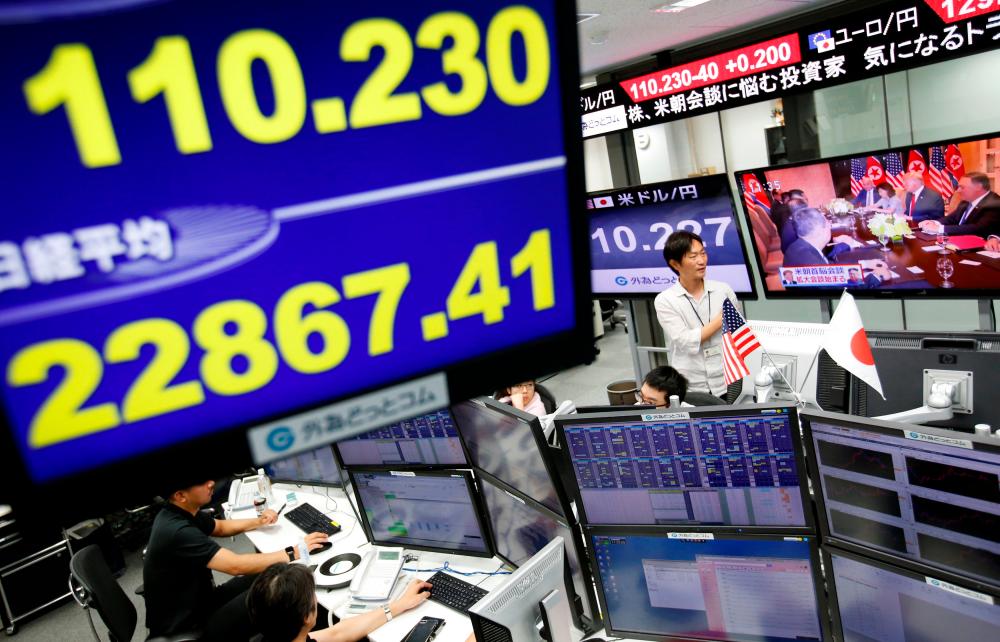TOKYO: Asian shares got off to a shaky start on Monday as investors were cautious ahead of a closely-watched Federal Reserve meeting, while political tensions in the Middle East and Hong Kong kept risk-appetite in check.
MSCI's broadest index of Asia-Pacific shares outside Japan opened slightly lower and was last little changed, while Japan's Nikkei average stood flat.
Wall Street stocks ended lower on Friday as investors turned cautious before this week's Fed meeting, while a warning from Broadcom on slowing demand weighed on chipmakers and added to U.S.-China trade worries.
"The week ahead is likely to provide some clarification for investors on three fronts that have been a source of uncertainty. The FOMC meeting, with updated forecasts, is centre stage," said Marc Chandler, chief market strategist at Bannockburn Global Forex.
A private gauge on eurozone's manufacturing sector as well as U.S.-China trade frictions will also be watched closely, Chandler said.
Financial markets have been sideswiped since a sudden escalation in Sino-U.S. trade tensions in early May, with growing anxiety among investors that a protracted standoff could tip the global economy into recession.
Adding to the tensions between the world's two biggest economies, U.S. Secretary of State Mike Pompeo told Fox News on Sunday that U.S. President Donald Trump would raise the issue of Hong Kong's human rights with China's President Xi Jinping at a potential meeting of the two leaders at the G20 summit in Japan later this month.
On Sunday, hundreds of thousands of black-clad protesters in Hong Kong demanded that Beijing-backed city leader Carrie Lam step down over her handling of a bill that would have allowed extradition to China, resulted her to issue a rare apology.
Geopolitical tensions in the Middle East added another layer of uncertainty for investors after the United States blamed Iran for attacks on two oil tankers in the Gulf of Oman last week.
Hopes that global central banks will keep the money spigot open have helped to temper some of the fears, and all eyes are on the Fed's two-day meeting starting on Tuesday.
Strong U.S. retail sales data on Friday rolled back expectations of a Fed rate cut at this week's meeting to 21.7%, from 28.3% on Thursday, according to CME Group's FedWatch tool. But bets of an easing at the July meeting remain high at 85%.
The Bank of Japan also meets this week and is widely expected to reinforce its commitment to retain a massive stimulus program for some time to come.
The retail report also sent short-dated U.S. Treasury yields higher, flattening the yield curve.
Benchmark 10-year notes was last at 2.091%, while two-year bond yield edged up, shrinking the spread between two- and 10-year yields to 23.6 basis points compared to more than 30 earlier this month.
A Reuters poll showed a growing number of economists expect the Fed policymakers to cut interest rates this year, although the majority still see it holding steady.
In currency markets, the dollar index against a basket of six major currencies climbed to 97.583 on Friday, its highest level in almost two weeks, after the U.S. retail sales data eased fears that the world's largest economy is slowing sharply.
The index last stood at 97.511, while the euro fetched $1.1220, near the lower end of its weekly trading range.
Oil extended gains on Monday after the attacks on two oil tankers last week raised concerns about potential supply disruptions, but prices remained on track for a weekly loss on fears that trade disputes will dent global oil demand.
Brent futures rose 0.2% to $62.13 a barrel, while U.S. West Texas Intermediate (WTI) crude futures rose 0.2% to $52.60.
Spot gold eased 0.1% to $1,340.25 an ounce after hitting a 14-month peak on Friday.
Bitcoin jumped overnight to $9,391.85, its highest level in 13 months. It was last quoted at $9150.15. - Reuters













